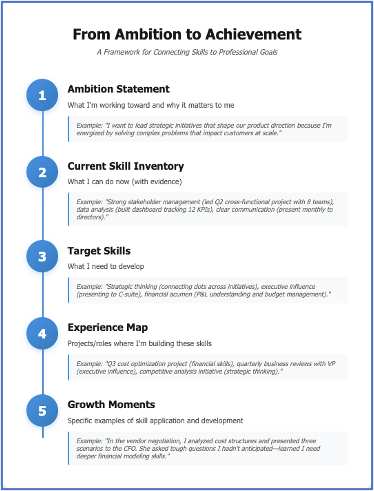Managing in the Age of Uncertainty

"SHOW ME THE FACTS."
Facts have always mattered to demonstrate results and performance. But facts matter in a different way for millennials and gen-z than they did for boomers, who could count on the corporate ladder to move their careers logically forward.
For boomers, the goal was always to show you were “doing the next job” before “you got the job.” In the boomer era, facts naturally aligned to the next step in a career path — because the path was clearly defined, level by level.
Not so for millennials and gen-z.
In this moment in time, here is what the best people want from their manager: show me the facts. How does working on your team create a “signature” or “capstone” opportunity to set me up for the growth — either on your team or somewhere else?
There’s no linear, predictable hierarchy of job levels on the corporate ladder any more. In the age of AI and the era of efficiency, the “next job” likely won’t exist in its current form, even in the very near future.
My research into the future of managing found that the next generation of talent knows they are charting their own career course, one chapter at a time, not one level at a time. They want the chapter spent on any team to produce a “best seller” to set them up for the next job, not the next level.
This issue of Managing in the Age of Uncertainty is focused on what facts mean to the next generation as one of the Six Drivers of Consistency As you read about facts, think about your team. Are your best people leading your most important priorities? Does everyone on the team know how to measure success? Do your metrics mean the same thing to everyone? Are you consistent or inconsistent with facts?
Why Facts Matter to People
Your people can only exceed expectations if they can communicate with facts to prove it.
Facts truly empower people, giving them an extra step in confidence, knowing their work has a foundation built on facts.
Facts also do something very important in the age of uncertainty: Facts make it easier for people to quickly tell their stories. In order to advance their careers, millennials and gen-z know they have to close the current chapter of their career story to demonstrate they are ready for the next chapter of growth, even if its on another team or organization.
In simplest terms, millennials and gen-z are adapting (and modernizing) the idea of advancement, and how to achieve it. But it will only work if you, as team manager, are consistent with facts.
What Expectations People Have for a Manager
In the boomer era, it was a common to hear this: “Anyone can make any piece of data mean anything.” It empowered people to “opt-out” of decisions and, yet, somehow still succeed.
On the other hand, my research showed millennials and gen-z expect managers to operate from a common set of facts aligned to your priorities and goals — to assure the team you will objectively evaluate results.
A team can only have one, single scorecard of success. When you operate from one source of truth, it focuses your team on what it can control and what matters to you: results.
As team manager, your dashboard of work — what you are accountable for — must be your consistent scorecard of success. The metrics on this dashboard make job roles aligned to your priorities and goals meaningful to someone’s career story.
When a job role is meaningful to someone, it taps into their emotional commitment to the role. We all know as managers that emotional commitment leads to discretionary effort; discretionary effort begets innovation; and innovation is the best way to blow the doors off expectations.
Consistency is the key. Every team should operate from a a single metrics taxonomy, where every measure is defined explicitly and the data used to inform it are documented and agreed to. Job role alignment is the key to maximizing productivity on any team. Every employee and their manager should be able to align their job results to the taxonomy and the goals being measured on your dashboard.
How It Helps Connect Career Dots in the Age of Uncertainty
In the end, when the work on a team is aligned to facts and data, it gives your people the confidence to know their job role and its responsibilities are aligned to your success. If you succeed, your people know exceeding expectations will have a good shot at being recognized and rewarded.
What your best people want is a chance to be the standout player on your dashboard. Give it to them.
In the age of uncertainty, organizations change fast, but facts don’t — facts inform the career story of your people — not always in the moment, but almost always when a collection of facts adds up consistently over time into a reputation for someone. Consistent facts are a win-win: you win with people on the team focused on the best results possible; while your people win with a career story that will stand the test of time….just like this…
Manager Thought of the Week
“Communicate with facts.”
This statement indeed stands the test of time as the most valuable career advice I received from the best manager I had at Cisco - Bill LePage, with apologies to John Chambers! It wasn’t a common practice for Cisco SVPs to write, narrative-style, a performance evaluation. Yet, Bill took the time, and those precious three words were emblazoned in the review: “Communicate with Facts.” I can hear him saying the words in his Boston accent. He correctly predicted the coming era of operational efficiency at Cisco, and his sage advice served me well for the next five years at the company.
In Summary: Principles of Managing in the Age of Uncertainty
- I left Cisco to answer this question with research and evidence: What does the manager of the future look like? What are millennials and gen-z seeking in a manager? Which behaviors, tactics, skills or processes matter? What’s it going to take to attract and keep the best people over the next decade? In short, how to be a great manager.
- Based on this research, the core philosophy of this newsletter is rooted in one idea: successful managers in this moment in time, for this generation of talent, need to be “career dot-connectors.” The next-gen doesn’t expect to spend their entire career on your team — that’s an idea boomers grew up with. A job on your team is like a chapter in a career story to the current generation. If you want the best people on your team, you have to connect the dots between roles on the team and the career opportunities of the people working on the team. People management. How to be a great manager
- What is the“Age of Uncertainty”? If the industrial age was about taking predictable steps up the ladder, the age of uncertainty is about finding or discovering the path of a career without any predictable steps, without an obvious ladder — it’s why being a career dot-connector will differentiate you as a manager. People management. How to be a great manager.
- How to be a Great Manager in the Age of Uncertainty: Be a Career Dot Connector is available on Amazon.
- What kind of manager are you? Take my free self-assessment and learn about yourself. It's the key to people management.




